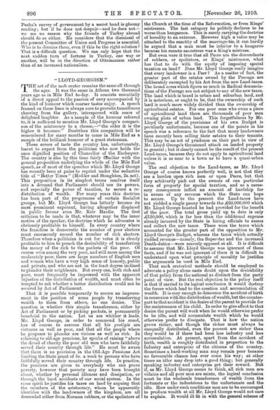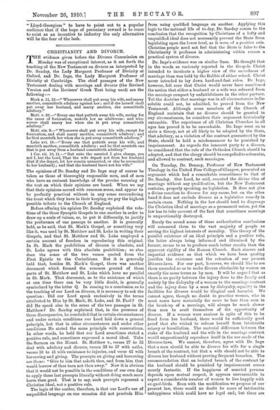" LLOYD-GEORGISM."
THE art of the mob orator remains the same all through • the ages. It was the same in Athens two thousand years ago as in Mile End to-day. It consists essentially of a direct appeal to the passion of envy accompanied by the kind of humour which coarser tastes enjoy. A speech framed on these lines is always sure to provoke tumultuous cheering from the gallery, interspersed with roars of delighted laughter. As a sample of the humour referred to, it is sufficient to mention Mr. Lloyd George's compari- son of the aristocracy to a cheese,—" the older it is the higher it becomes." Doubtless this comparison will be remembered for many months to come in Mile End as a sample of the brilliant humour of a great statesman.
These errors of taste the country has, unfortunately, learnt to expect from the politician who now holds the once dignified position of Chancellor of the Exchequer. The country is also by this time fairly fl•miliar with the general proposition underlying the whole of the Mile End speech, as of most of the speeches which Mr. Lloyd George has recently been at pains to reprint under the seductive title of "Better Times" (Hodder and Stoughton, 2s. net). This proposition in its simplest terms resolves itself into a demand that Parliament should use its powers, and especially the power of taxation, to secure a re- distribution of wealth. For many years this doctrine has been part of the programme of certain Socialist groups, but Mr. Lloyd George has latterly become its most prominent exponent, having altogether displaced in public favour even Mr. Heir Hardie. The first criticism to be made is that, whatever may be the inner motive of the speaker, the doctrine which he advocates is obviously profitable to himself. In every country where the franchise is democratic the number of poor electors must enormously exceed, the number of rich electors. Therefore when a politician is out for votes it is clearly profitable to him to preach the desirability of transferring the money of the rich to the pockets of the poor. Of course even among the very poor, and still more among the moderately poor, there are large numbers of English men and women who have a very high sense of honesty, public and private, and who are not in the least degree inclined to plunder their neighbours. But every one, both rich and poor, must frequently be impressed with the apparent injustice of the distribution of wealth, and must often be tempted to ask whether a better distribution could, not be secured by Act of Parliament.
That it is possible temporarily to secure an improve- ment in the position of some people by transferring wealth to them from others, no one denies. The question is whether this simple transference, either by Act of Parliament or by picking pockets, is permanently beneficial to the nation. Let us see whither it leads. Mr. Lloyd George, in order to commend his creed, has of course to assume that all his proteges are virtuous as well as poor, and that all the people whom he proposes to plunder are vicious as well as rich. In referring to old-age pensions, he speaks of raising "above the dread of charity the poor old men who have faithfully served their country through life." He must be aware that there is no provision in the Old-Age Pensions Act limiting the State grant of 5s. a week to persons who have faithfully served their country through life. In practice, the pensions are given to everybody who can prove poverty, however that poverty may have been brought about, whether by personal idleness and dissipation, or through the hard accidents of our social system. In the same spirit he justifies his taxes on land by arguing that the members of the aristocracy, whom he apparently identifies with the landowners of the kingdom, are all descended either from Norman robbers, or the spoliators of the Church at the time of the Reformation, or from Kings' mistresses. The last category he politely declares to be worse than kangaroos. This is surely carrying the doctrine of heredity to an extreme. However high a value may be attached to the sanctity of the marriage-tie, it can hardly be argued that a man must be inferior to a kangaroo because his remote ancestress was a King's mistress.
But even were it true that all Peers are the descendants of robbers, or spoliators, or Kings' mistresses, what has that to do with the equity of imposing special taxation on land? Does Mr. Lloyd. George really imagine that every landowner is a Peer ? As a matter of fact, the greater part of the estates owned by the Peerage. are deliberately exempted by his Act from the new Land-taxes. The broad acres which figure so much in Radical denuncia- tions of the Peerage are not subject to any of the new taxes. The land which is taxed is urban and suburban land, and it is notorious, or ought to be, that the ownership of such land is much more widely divided than the ownership of agricultural estates. For one poor man who owns a piece of agricultural land there are thousands of poor men owning plots of urban land. This forgetfulness by 31(r. Lloyd George of the provisions of his own Budget is pecnliarly unfortunate, because one of the points in his speech was a reference to the fact that many landowners have recently been selling their estates to their tenants. This may be an act of prudence on their part in view of Mr. Lloyd George's threatened attack on landed property in general ; but it dearly cannot be the result of the present Land-taxes, because they do not apply to agricultural land unless it is so near to a town as to have a quasi-urban value.
The real objection to the Land-taxes, as Mr. Lloyd George of course knows perfectly well, is not that they are a burden upon rich men or upon Peers, but that they arbitrarily pick out the owners of one particular form of property for special taxation, and as a neces- sary consequence inflict an amount of hardship far in excess of any revenue which the State can hope to secure. Up to the present the Land-taxes have not yielded a single penny towards the £20,000,000 which Mr. Lloyd George boasted he had provided for the benefit of the poor. The total gross yield up to date is only £120,000, which is far less than the additional expense already incurred by the State in hiring officials to assess and collect the new taxes. These were the taxes which accounted for the greater part of the opposition to Mr. Lloyd George's Budget, whereas the taxes which actually yielded revenue—namely, the Super-tax and the increased Death-duties—were scarcely opposed at all. It is difficult to assume that Mr. Lloyd George was ignorant of these facts, and if he was not ignorant of them it is difficult to understand upon what principle of morality he justifies the arguments he used in Mile End.
That such oratorical methods should be employed to advocate a policy alone casts doubt upon the desirability of that policy from the national as distinct from the party point of view. But the real objection to the policy itself is that if carried to its logical conclusion it would destroy the forces which lead to the creation and accumulation of wealth. It is easy enough to denounce the accident of birth in connexion with the distribution of wealth,but the counter- part to that accident is the desire of the parent to provide for the maintenance of his child. In order to give effect to that desire the parent will work when he would otherwise prefer to be idle, and will accumulate wealth which he would otherwise prefer to dissipate. That is how the nation grows richer, and though the riches must always be unequally distributed, even the poorest are richer than they would be if there had been less industry and less accumulation. At present, apart from the accident of birth, wealth is roughly distributed in proportion to the industry and enterprise of the citizens of the country. Sometimes a. hard-working man may remain poor because no favourable chance has ever come his way ; at other times an idler may drop into a good thing; but generally speaking industry and enterprise get their reward. But if, as Mr. Lloyd George seems to think, all rich men are villains and all poor men are saints, the logical conclusion must be the wholesale transference of wealth from the fortunate or the industrious to the unfortunate and the idle. How under such conditions men are to be encouraged to produce wealth at all Mr. Lloyd George would not care to explain. It would ill fit in with the general scheme of " Lloyd-Georgism " to have to point out to a popular audience that if the hope of pecuniary reward is to cease to exist as an incentive to industry the only alternative will be the fear of the lash.



















































 Previous page
Previous page